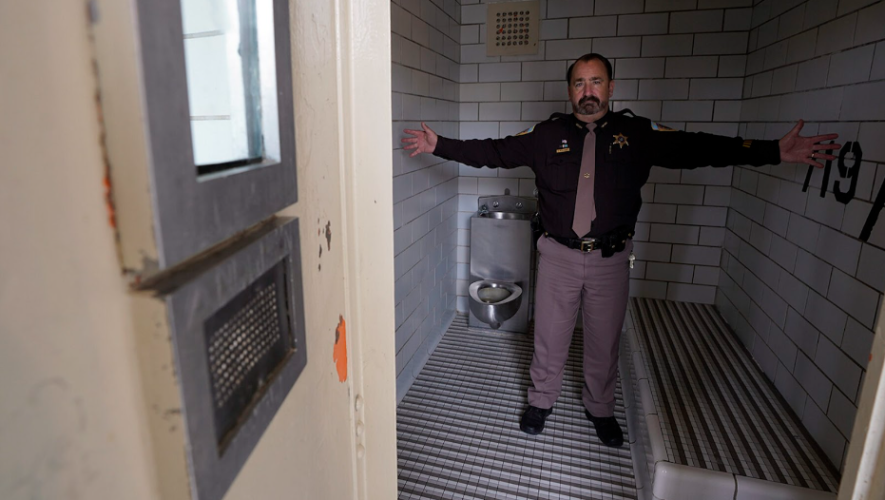Solitary confinement is a form of punishment used in jails and prisons that isolates incarcerated individuals for up to twenty-three hours per day for weeks, or even months at a time. The actions that condemn incarcerated individuals to solitary confinement range from serious infractions, like engaging in a physical fight, to minor violations, like talking back to a guard.
This isolation has severe physical and mental side effects, including brain damage, depression, anxiety, and psychosis, with some cases leading to self-harm and suicide attempts. Solitary confinement deprives incarcerated individuals from social interactions, access to sunlight, as well as educational and rehabilitative programs. The inhumane and demoralizing nature of this punishment does not align with American values, such as justice, equality, and respect for human dignity, which should solicit the implementation of a federal policy.
Mental Health Consequences
Social interaction and mental health resources are often withheld from incarcerated individuals while in solitary confinement, leading to mental deterioration. A study conducted in 2022 that examined the unmet healthcare needs of ninety-nine men held in solitary confinement for about fifteen days found that each person experienced a lack of idle time, which led to increased anxiety. Additionally, many felt ignored by the medical staff and consequently had limited access to treatment, specifically mental health treatment, with little trust in the medical care they received.
Medical care is often withheld from incarcerated individuals while in solitary confinement. Security measures may prevent prisoners from accessing inpatient psychiatric care and treatment options. Furthermore, physical isolation from other incarcerated individuals and staff can cause medical or psychiatric emergencies to go unnoticed, potentially leading to life-threatening situations.
Similarly, a study conducted in 2020 measured psychological distress among incarcerated individuals in long-term solitary confinement. These researchers embedded questions from the Brief Psychiatric Rating Scale (BPRS) in interviews with incarcerated individuals and conducted a follow-up interview a year later using the same approach to analyze the mental consequences of solitary confinement. Twenty-five percent of respondents felt a loss of identity, 16 percent experienced high levels of anxiety, and 73 percent experienced feelings of social isolation. Twenty-two percent of respondents had documented suicide attempts and 18 percent had practiced self harm while in solitary confinement. As a result, solitary confinement creates a dangerous cycle that makes prisoners more “difficult” to manage, further entrenching them in the criminal justice system.
As more prisons force more people into solitary confinement, the likelihood of recidivism, the tendency to reoffend, increases. Incarcerated individuals in solitary confinement develop mental disorders at a greater rate than those in general levels of confinement because individuals who suffer from mental disorders are more prone to violence. A cycle is created where solitary confinement is imposed on incarcerated individuals with mental disorders, their condition is worsened, more violence is caused, their chances of reoffending are increased, and they are kept trapped in the system. Furthermore, limited access to psychological care while incarcerated exacerbates these issues, preventing proper treatment and rehabilitation.
Incarcerated individuals in solitary confinement not only have limited access to medical care, but also to education programs. According to the National Adult Literacy Survey, 70 percent of incarcerated adults cannot read at a fourth-grade level. The skills needed to accomplish daily tasks or maintain working-class jobs after release are deprived from the majority of incarcerated individuals in solitary confinement.
A study found that 33 percent of previously incarcerated people found no employment after four years post-release. This lack of access to jobs hinders rehabilitation and reintegration into society. If prisons fail to provide incarcerated individuals with adequate educational opportunities, it becomes significantly more difficult for incarcerated individuals to develop necessary skills to become functioning members of society. This not only limits an individual’s potential to change, but also perpetrates a cycle of crime, poverty, and dependence on social services. When prisons serve as a roadblock for education, it undermines incarcerated individuals’ ability to contribute positively to their communities once released, ultimately harming society as a whole.
Outlawing Solitary Confinement
In a country that prides itself in equality, justice, and fairness, the mistreatment of people, especially those who are incarcerated, directly contradicts these core values. The inhumane treatment of incarcerated individuals violates human rights and undermines the very ideals of America. Actual justice requires not only respect for human rights, but also a commitment to rehabilitation—rather than punishment through neglect and suffering.
The Mandela Rules, a set of guidelines ensuring humane conditions for prisoners, redefined the United Nations’s rules on solitary confinement in 2015, characterizing isolation without meaningful human contact for more than fifteen consecutive days as torture. Despite this, the average time an incarcerated individual spends in solitary confinement is typically one to three months, two to six times the standard defined as torture.
With international consensus on solitary confinement as a form of torture, it is clearly a violation of the Eighth Amendment to the US Constitution, which protects people from cruel and unusual punishments. Not only is solitary confinement considered inhumane, but it is also regarded as unconstitutional, and must be outlawed.
Banning solitary confinement in prisons is a realistic goal that would not only allow prisons to take a step towards more humane and just incarceration practices, but also benefit the broader community. Solitary confinement is one of the most expensive and staff-intensive forms of incarceration. In comparison to those held in standard conditions, solitary confinement doubles to triples the cost of incarceration. Eradicating solitary confinement would save hundreds of millions of dollars, reducing the financial burden on the prison system.
In New York, many lawmakers are fighting to pass the Humane Alternatives to Long-Term Solitary Confinement (HALT) Act, which restricts the use of solitary confinement. Examples of people who are not allowed to be placed in solitary confinement under HALT include pregnant women, those younger than 21 or older than 55, or anyone with chronic mental illnesses or disabilities.
By implementing the HALT Act, New York State and its local governments could save up to $132 million annually. This opens up more resources for rehabilitative and restorative justice initiatives, a process that focuses on healing harm instead of punishment, including educational services, mental health counseling, and vocational training. This would improve long-term outcomes for the incarcerated population, and ultimately ease their reintegration into society by equipping them with the proper skills and support to succeed post-release.
In addition to this, the implementation of a federal law using these principles would create a consistent, nationwide approach to rehabilitation and as a result, benefit taxpayers by reducing the costs of mass incarceration. In 2023, Senate Democrats introduced the End Solitary Confinement Act which would prevent isolation for no more than four hours in order to de-escalate an emergency situation, with staff interaction required every hour. Since the bill’s introduction, no progress has been made to pass it. However, by continuing to spread awareness about the harm caused by solitary confinement to incarcerated people, public pressure can be built to encourage reform.
Solitary confinement undermines the very purpose of prisons—rehabilitation and reintegration, not punishment that perpetuates suffering. While initiatives have been taken by some states to ban solitary confinement, a federal law should be implemented to outlaw it throughout the nation, ensuring that human dignity is upheld and the values of fairness and justice are aligned with the criminal justice system.



